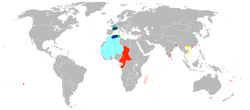Free French Army
| Free France | ||||||||||
| La France Libre | ||||||||||
| Government in exile, provisional government over unoccupied and liberated territories | ||||||||||
|
||||||||||
|
|
||||||||||
|
||||||||||
| Capital | Paris | |||||||||
| Capital-in-exile |
|
|||||||||
| Religion | Secular state | |||||||||
| Political structure | Government in exile, provisional government over unoccupied and liberated territories | |||||||||
| Leader | Charles de Gaulle | |||||||||
| Historical era | World War II | |||||||||
| • | de Gaulle's appeal | 18 June 1940 | ||||||||
| • | Liberation of France | 25 August 1944 | ||||||||
|
||||||||||
Free France and its Free French Forces (French: France Libre and Forces françaises libres) were the government-in-exile led by Charles de Gaulle during the Second World War and its military forces, that continued to fight against the Axis powers as one of the Allies after the fall of France. Set up in London in June 1940, it was organised and supported the Resistance in occupied France.
Charles de Gaulle, a French government minister who rejected the armistice concluded by Marshal Philippe Pétain and who had escaped to Britain, exhorted the French to resist in his BBC broadcast "Appeal of 18 June" (Appel du 18 juin), which had a stirring effect on morale throughout France and its colonies, although initially relatively few French forces responded to de Gaulle's call.
On 27 October 1940, the Empire Defense Council (Conseil de défense de l'Empire) was constituted to organise the rule of the territories in central Africa, Asia and Oceania that had heeded the 18 June call. It was replaced on 24 September 1941 by the French National Committee (Comité national français or CNF). On 13 July 1942, "Free France" was officially renamed France combattante ("Fighting France"), to mark that the struggle against the Axis was conducted both externally by the FFF and internally by the French Forces of the Interior (FFI). After the reconquest of North Africa, this was in turn formally merged with de Gaulle's rival general Henri Giraud's command in Algiers to form the French Committee of National Liberation (Comité français de Libération nationale or CFNL). Exile officially ended with the capture of Paris by the 2nd Armoured Free French Division and Resistance forces on 25 August 1944, ushering in the Provisional Government of the French Republic (gouvernement provisoire de la République française or GPRF). It ruled France until the end of the war and afterwards to 1946, when the Fourth Republic was established, thus ending the series of interim regimes that had succeeded the Third Republic after its fall in 1940.
...
Wikipedia



